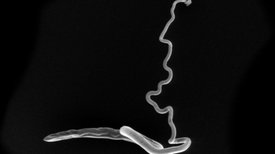The whipworm lives in the human gut, mooching microbes from its host to build its own microbiome.
鞭虫生存在人类肠道中,从它寄宿的地方获取细菌来建造属于自己的菌群。
撰文\播音:克里斯托弗•因塔利亚塔(Christopher Intagliata)
翻译:陈美娟
审校:杨枭
The whipworm is a parasite that infects half a billion people around the world. It lives in the gut—burying its head in the large intestine, causing symptoms like nausea, abdominal pain and diarrhea.
鞭虫是一种在全球范围内感染了数十亿人的寄生虫。它生活在肠道中——它把头部埋在大肠中,导致人们产生例如恶心、腹部疼痛和腹泻的症状。
But the worm's place of residence also reveals a potential weakness: the parasite needs to steal some of our own gut bacteria to thrive.
但是这种蠕虫寄生的位置同样显露了它的致命弱点:这种寄生虫需要通过窃取我们的肠道细菌才得以苟活。
"It takes them from the host and then bends it to generate a population which suits itself." Richard Grencis, an immunoparasitologist at the University of Manchester in the U.K. "So if they have bacteria, then they survive, if they don't have bacteria, they don't survive." “它们从宿主那里获取这些细菌,并迫使它们成为一个利于自己的菌群。因此,如果你的肠道里没有细菌,那么它们也不能存活。”来自英国曼彻斯特大学的免疫寄生菌学家理查德·格伦西斯(Richard Grencis)说道。
Grencis and his team studied that phenomenon in mice—there’s a type of whipworm adapted to them, too. And they found that when whipworms hatch, they acquire a fresh microbiome derived from the host's own microbiome, but with different proportions of species. Without that host contribution, the worms die. 格伦西斯与他的团队用小鼠研究了这种现象——它们体内也有种鞭虫适应了这种情况。研究人员发现,当鞭虫孵化的时候,它们需要来自宿主体内的新鲜菌群,只不过菌群种类的比例不同而已。如果没有来自宿主的“贡献”,这些蠕虫就会死亡。
But the worms also induce changes in the host's microbiome—tweaking it so the gut is no longer hospitable to hatching.
但蠕虫同样会减少宿主体内的菌群变化——这些细菌被转化之后,肠道就不再是它孵化的适宜场所了。
"Now you'd have to ask, that seems a little bit paradoxical, because maybe the parasite wants to have more hatching rather than less." But here's the catch: Go on a hatching spree, and the host's immune system is going to take notice, and kick all the worms out.
“现在你可能会问,这看起来这有点相悖,因为寄生虫可能宁愿孵出更多后代。”
但你只要捉住这点,这个问题就不是个问题了:一旦寄生虫开始疯狂的孵化过程,宿主的免疫系统就会立马察觉并把这些寄生虫全部赶出去。
"If the eggs don't hatch as effectively, you don't get as many new worms coming in, you delay the process of host immunity being acquired and then expelling the parasites. So it's a strategy that might have evolved to help perpetuate the life of the parasite, so it could stay there a bit longer."
“如果这些虫卵不能有效地孵出,你就不会让更多新的蠕虫有寄生的机会,你会延迟发生免疫反应并驱逐寄生虫的进程。所以这是寄生虫进化出的一种来使寄生虫的生命持续下去生存策略,让它们能在肠道中停留的时间更久。”
The results are in the journal Science Advances. [Emily C. White et al., Manipulation of host and parasite microbiotas: Survival strategies during chronic nematode infection]
这项研究结果发表在《科学进展》杂志中。
Grencis says the findings might someday lead to a way to selectively target the worms. So that whipworms no longer mooch off us—or our microbes.
格伦西斯说,可能在某天这项发现能指引我们找出选择性标记目标寄生虫的方法,这样鞭虫就不能再从我们这获取细菌了。

 京公网安备11010502039775号
京公网安备11010502039775号  京公网安备11010502039775号
京公网安备11010502039775号 
















